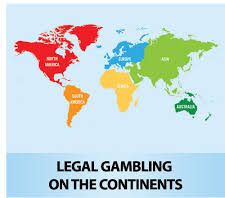
Online gambling has become a global phenomenon, but its legality varies widely across different regions. While some countries embrace it, others impose strict regulations or outright bans. Understanding the legal landscape of online gambling is essential for players, operators, and policymakers alike. This article explores the varying legal status of online gambling across major regions of the world, highlighting the challenges and opportunities that arise from differing laws and regulations.
1. North America: A Complex Patchwork of Regulations
In North America, the legality of online gambling is a complex issue. In the United States, the federal government’s stance on online gambling is somewhat ambiguous. While the Unlawful Internet Gambling Enforcement Act (UIGEA) of 2006 made it difficult for financial institutions to process transactions for online gambling, it did not explicitly prohibit it. This led to a patchwork of state-level regulations where each state has the authority to legalize or ban online gambling within its borders. As of now, New Jersey, Pennsylvania, Michigan, and West Virginia are among the states where online casinos and sports betting are legal and regulated. On the other hand, many states continue to prohibit online gambling entirely, or only allow limited forms, such as online poker.
In Canada, online gambling is generally legal, but it is regulated on a provincial level. Provinces like British Columbia and Ontario have established their own regulated online gambling platforms, allowing players to wager on sports, casino games, and more. However, some provinces restrict access to offshore gambling sites, and the rules can differ significantly depending on the region.
2. Europe: Progressive and Well-Regulated Markets
Europe is one of the most progressive regions when it comes to online gambling regulation. The European Union (EU) allows member states to regulate online gambling individually, but it mandates that these regulations must comply with certain standards to promote fairness and consumer protection. Many European countries have established robust legal frameworks for online gambling, with some even encouraging the industry as a significant source of revenue.
Countries like United Kingdom and France have some of the most comprehensive and well-regulated online gambling markets. The UK Gambling Commission ensures that all online gambling operators adhere to strict licensing and operational standards. Similarly, Spain, Italy, and Denmark have their own licensing bodies that regulate online gambling. In contrast, countries like Norway and Sweden have historically been more restrictive, although Sweden has recently opened up to licensed operators under its newly reformed gambling laws.
3. Asia: Mixed Regulations and Strict Enforcement
Asia presents a mixed picture when it comes to online gambling. In China, online gambling is strictly prohibited, with authorities cracking down on illegal offshore gambling sites and operations. The government’s efforts to curb online gambling have been effective in many areas, although many Chinese players still access international gambling sites through VPNs and other means.
In Japan, online gambling is largely illegal, except for a few specific forms, such as betting on horse racing and motor sports. However, Japan is an outlier in the region, as other countries like Macau and Singapore have thriving regulated gambling markets. Macau, often referred to as the “gambling capital of the world,” operates both land-based casinos and regulated online platforms that cater to both domestic and international players. Similarly, Singapore has legalized online sports betting through Singapore Pools, a government-run organization that also oversees offline betting.
Other countries in Asia, like India, have unclear or evolving legal frameworks. While online gambling is not explicitly banned in most states, it operates in a gray area with some regions taking a more stringent stance, while others remain lenient toward international operators.
4. Australia and Oceania: Highly Regulated Markets with Limited Options
In Australia, online gambling is legal but tightly regulated under the Interactive Gambling Act (IGA) of 2001. The IGA prohibits Australians from accessing offshore online casinos and poker rooms, but players can legally participate in online sports betting and lotteries. Australian states have their own additional regulations, and the government has cracked down on illegal gambling operators. Despite these restrictions, Australia remains a large market for legal online sports betting, with popular platforms like Sportsbet and Tabcorp.
In New Zealand, online gambling is also legal, but heavily regulated. The country allows online sports betting via Tab NZ, the state-run betting operator, but restricts other forms of online gambling. Players are allowed to access international online casinos and poker sites, but such activities are technically in a legal gray area, with enforcement focused primarily on local operators.
5. Africa: Emerging Markets with Variable Legal Status
The landscape for online gambling in Africa is varied, with some countries embracing it while others maintain strict prohibitions. South Africa is one of the few African nations with a well-established legal framework for online gambling, particularly for sports betting and casino games. The country regulates online gambling through the National Gambling Board, and players can access licensed operators.
In other parts of Africa, the legal status of online gambling remains ambiguous. Countries like Nigeria and Kenya are seeing rapid growth in online betting markets, especially for sports, but there is often a lack of clear regulations governing the industry. In many regions, online gambling is still subject to local laws, and players may face legal risks depending on their country’s stance on the matter.
Conclusion: Navigating the Global Online Gambling Landscape
The legality of online gambling varies greatly by region, and understanding local laws is essential for players who wish to gamble online safely and responsibly. While many countries in Europe and North America have well-regulated, legal markets, regions like Asia, Africa, and parts of Oceania still have restrictive or unclear laws. As the industry continues to grow, more countries are likely to adopt clearer regulations, either embracing or restricting online gambling based on cultural and economic factors. Players must always stay informed about the legal status of online gambling in their own jurisdiction to avoid potential issues.
Experience the thrill at KKClub – your top online casino for big wins and exciting games!





